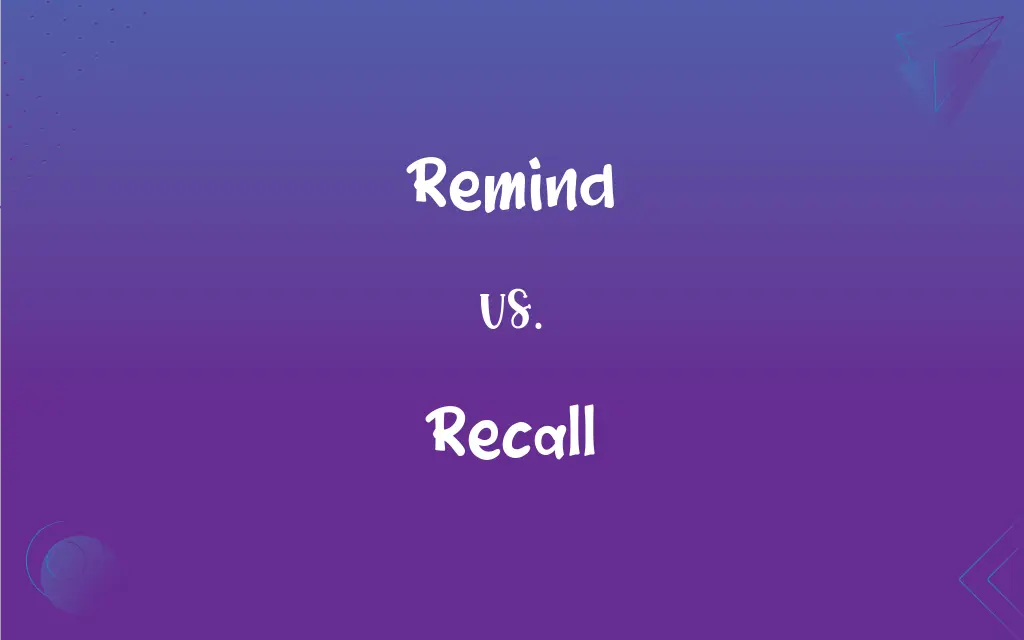Remind vs. Recall: What's the Difference?
Edited by Janet White || By Harlon Moss || Updated on November 6, 2023
Remind is to cause someone to remember something; recall is to bring a past event back into one's mind.

Key Differences
The terms "remind" and "recall" are both related to the process of bringing a thought, fact, or memory back into one's mind, yet they diverge in their connotations and uses. To remind is often an external process, where something or someone outside oneself triggers the memory. In contrast, to recall is an internal process, initiated by the person themselves, to retrieve a memory from the depths of their mind. Reminders are typically deliberate cues or prompts that aim to jog one's memory, whereas recall does not necessarily require an external prompt and relies on one's ability to access information or memories without direct stimuli.
In the context of memory, "remind" usually involves some form of intention or purpose. An object, event, or person can remind you of something you might otherwise forget. For example, seeing a photograph might remind you of a past event, whereas recall would involve actively trying to bring that event to mind without seeing the photograph. Recall is the cognitive action of retrieving the memory, while remind is often the trigger that facilitates the act of recalling.
From a linguistic standpoint, the word "remind" is often used in a communicative context, where one person helps another to remember something. "Could you remind me to send that email?" illustrates a request for assistance in remembering. On the other hand, "recall" is about the capability or act of remembering itself. For instance, during a test, a student needs to recall information they have studied; there are no external cues to remind them. This difference highlights that "remind" can be seen as a collaborative effort, while "recall" is a solitary one.
In practice, "remind" and "recall" can sometimes be used interchangeably, but they serve different functions. A calendar notification might remind you of an appointment, serving as an external prompt. In contrast, you recall the details of the appointment—like the time and place—through internal cognitive effort. Remind is therefore a support mechanism to the memory process, while recall is the process itself.
The effectiveness of remind and recall can also be subject to the individual's memory strength and the context. People set reminders for tasks because they anticipate that they might not recall them on their own when necessary. In contrast, people with strong recall abilities may rely less on reminders because they trust their internal retrieval processes. Remind provides a safety net for those who may not trust their recall ability, whereas recall depends on the strength of memory and cognitive retrieval skills.
ADVERTISEMENT
Comparison Chart
Trigger
External cues
Internal effort
Action
Prompting someone to remember
Actively retrieving a memory
Direction
Can be directed at self or others
Typically self-directed
Volition
Can be voluntary or involuntary
Usually a voluntary process
Association
Often associated with tasks or responsibilities
Often associated with past experiences or knowledge
ADVERTISEMENT
Remind and Recall Definitions
Remind
To cause someone to remember.
The alarm will remind you to take your medicine.
Recall
To summon a fact or event from memory.
He recalled the facts during the quiz.
Remind
To prompt an action.
Please remind me to call John back.
Recall
To remember something from the past.
She recalled her first day of school vividly.
Remind
To mention a forgotten detail.
I must remind you that the rent is due tomorrow.
Recall
To withdraw or call back.
The company recalled the defective products.
Remind
To bring to someone's attention.
The movie reminded us of the importance of family.
Recall
To bring back into one's mind.
I can't recall where I put my keys.
Remind
To serve as a cue.
Seeing her smile reminds me of my mother.
Recall
To revoke or annul.
The order was recalled by the general.
Remind
To cause to remember; put in mind
Must remind him to call.
Reminded her of college days.
Recall
To ask or order to return
Recalled all workers who had been laid off.
Remind
(transitive) To cause one to experience a memory (of someone or something); to bring to the notice or consideration (of a person).
Recall
To remember; recollect
I don't recall her name.
Remind
To put (one) in mind of something; to bring to the remembrance of; to bring to the notice or consideration of (a person).
When age itself, which will not be defied, shall begin to arrest, seize, and remind us of our mortality.
Remind
Put in the mind of someone;
Remind me to call Mother
Remind
Assist (somebody acting or reciting) by suggesting the next words of something forgotten or imperfectly learned
FAQs
Do reminders have to be objects?
No, they can also be words, events, or dates.
What does it mean to recall something?
To bring a past memory back into your mind.
Is recall always intentional?
Typically, yes, but it can be spontaneous.
Can you remind yourself?
Yes, by setting a reminder.
Does recall decrease with age?
It can, as memory retrieval may become harder.
What does it mean to remind someone?
To cause them to remember something.
Can something remind you of a feeling?
Yes, reminders can be emotional triggers.
How can technology help remind us?
Through alarms, apps, and notifications.
Is recall the same as remembering?
Yes, recall is a form of remembering.
What's a common reminder tool?
A calendar or agenda.
Can animals remind humans?
Yes, through behavior that prompts a memory.
Can you train your recall ability?
Yes, with memory exercises and practice.
What's an example of a visual reminder?
A post-it note on your desk.
Why do people set reminders?
To ensure they don't forget tasks or events.
Is recall necessary for learning?
Yes, it's crucial for reinforcing knowledge.
Can recall happen without wanting it to?
Yes, memories can surface unexpectedly.
Are reminders always helpful?
Usually, but they can be ignored or overlooked.
Is recall related to intelligence?
It's a cognitive function but not solely indicative of intelligence.
Can stress affect recall?
Yes, it can impair memory retrieval.
Can everyone recall dreams?
Not everyone, as dream recall varies.
About Author
Written by
Harlon MossHarlon is a seasoned quality moderator and accomplished content writer for Difference Wiki. An alumnus of the prestigious University of California, he earned his degree in Computer Science. Leveraging his academic background, Harlon brings a meticulous and informed perspective to his work, ensuring content accuracy and excellence.
Edited by
Janet WhiteJanet White has been an esteemed writer and blogger for Difference Wiki. Holding a Master's degree in Science and Medical Journalism from the prestigious Boston University, she has consistently demonstrated her expertise and passion for her field. When she's not immersed in her work, Janet relishes her time exercising, delving into a good book, and cherishing moments with friends and family.































































